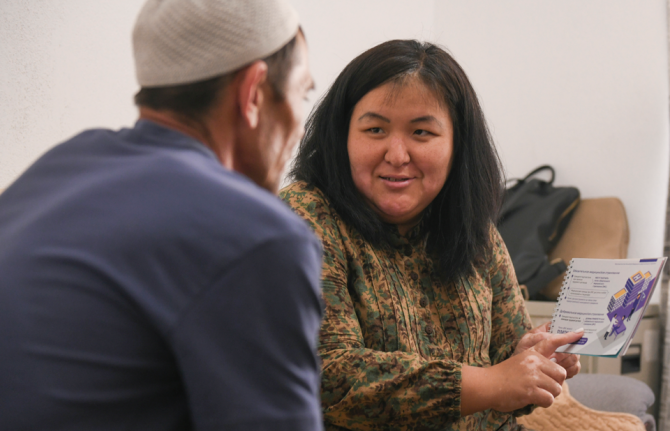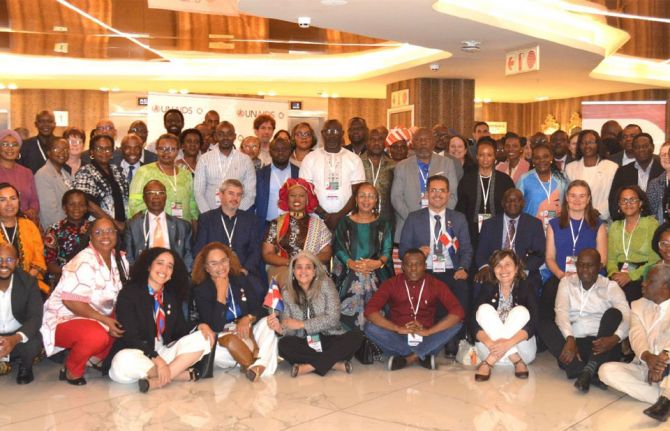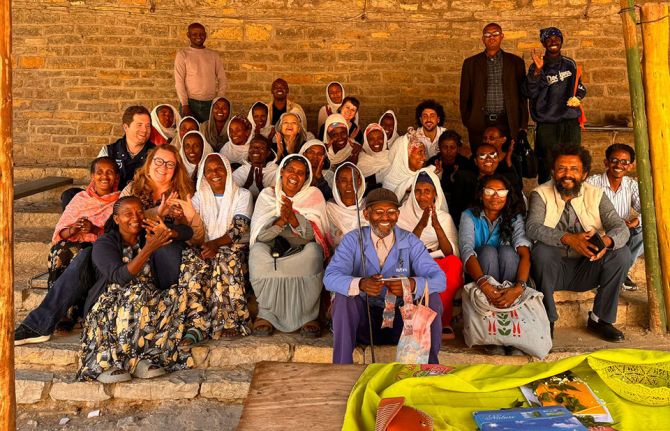
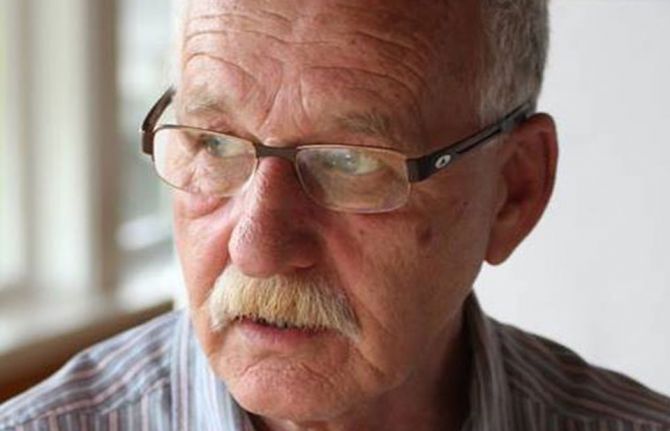
Feature Story
Celebrating the life of Calle Almedal
13 June 2018
13 June 2018 13 June 2018UNAIDS is remembering the life and work of Calle Almedal, UNAIDS Senior Adviser on Partnerships with Civil Society and Faith-Based Organizations from 1997 to 2007. He was born in Sweden in 1945 and died on 7 June 2018 following a long battle with cancer.
“Calle Almedal was an outstanding professional, a passionate advocate and a personal friend and colleague. His legacy lives on in the lives of people of faith and of no faith in every corner of the world,” said Michel Sidibé, the Executive Director of UNAIDS.
Mr Almedal pioneered UNAIDS’ work with a wide range of civil society groups. Through his work, new and innovative partnerships were forged that developed the capacity of partners to respond to the HIV epidemic. For example, he brokered a partnership between the Federation of the Red Cross and Red Crescent Societies (IFRC) and the Global Network of People Living with HIV that resulted in the IFRC’s offices offering space to newly formed country networks of people living with HIV.
However, he is best known for his work with the faith community. He championed the concept of AIDS-competent churches and was a passionate advocate for human rights and justice for people living with HIV. He also championed the rights of people on the margins of society, particularly people ostracized by faith communities.
A person of faith himself, Mr Almedal challenged faith communities to address issues inside their own communities that put people at risk of HIV before addressing issues outside of the community. Without this so-called in-reach work, he explained that the church would lose its credibility—he gave the same challenge to UNAIDS.
He worked in a way that drew people towards him. He was known for his quick wit, keen sense of humour and sharp critique—a combination of qualities that, along with his dedication, passion and drive, made his work in partnerships so successful.
Mr Almedal trained in nursing and public health and theology. Prior to joining UNAIDS, he served in Lebanon, the Lao People’s Democratic Republic, Mozambique, Thailand and Yemen with the Norwegian Red Cross.
Related

Feature Story
Resilient despite the odds: the people of South Sudan
11 June 2018
11 June 2018 11 June 2018Mother of five Regina Mateo shows us her home in Wau, South Sudan—a temporary shelter at the protection of civilians (POC) refugee site. She brought her family here to seek refuge from violence and instability in her village. However, Ms Mateo and her family are eager to return home as soon as it is safe to leave.
Everyone wants a safe place to call home. But, with conflict and violence ongoing throughout much of the country, that is too much to ask for many in South Sudan at the moment. The Wau POC holds a population of 20 880 people, but there are many other sites offering refuge. In Juba, the POC holds 39 405, in Bentiu 116 725, in Malakal 24 417 and in Bor 2296. Many people leave the POCs during the day to work but return at night from fear of violence at the hands of armed groups.
During his recent visit to Wau, UNAIDS Executive Director Michel Sidibé was welcomed by a network of women and girls living with HIV and representatives of service providers from the United Nations family and local government. He said, “With the collapse of health infrastructure and upheaval of entire communities in conflict zones, continuity of treatment and care has become difficult in the extreme. But the people of South Sudan are resilient. And this brings us hope.”
Mr Sidibé visited the Wau POC to better understand the living conditions of people who have been displaced as well as the services available to them. Living conditions are difficult, with limited basic services. Everyone is desperate for peace so that they can return home.
Despite these challenging circumstances, the United Nations family is working together to deliver basic services. A highlight is the delivery and stabilization units in health facilities supported by the International Organization for Migration and the United Nations Population Fund that serve both the people who have been displaced and the host community and which integrate HIV services as part of broader primary health-care services.
Survivors of gender-based violence are also able to access psychosocial support and clinical management of rape services. These services are available in part thanks to UNAIDS resources complementing resources from the Global Fund to Fight AIDS, Tuberculosis and Malaria.
Mr Sidibé met with the Governor of Wau, Angelo Taban, and, together with the State Minister of Health, they visited the Wau Teaching Hospital, where they met peer mentor mothers who are living with HIV but who have given birth to HIV-negative babies. The health personnel are doing tremendous work despite the tough working conditions.
At the Juba Teaching Hospital, the South Sudan Network of People Living with HIV described the critical challenges many people are facing. “Many people living with HIV are lost to follow-up, due to the current crisis. Many of them are in the South Sudan bush, many others are on the move to neighbouring countries without medication. Those in towns are dying in silence due to poverty.” But hope is alive. A whole new generation of midwives are being trained, making real the right to health and non-discrimination in health facilities.
Despite all the challenges, from conflict to a collapsing health infrastructure, insufficient funds and unmet basic needs, the people of South Sudan are resilient.
Region/country
Related

Feature Story
Luxembourg committed to accelerating the AIDS response in western and central Africa
11 June 2018
11 June 2018 11 June 2018The Government of Luxembourg has announced that it will renewal its €1 million contribution to UNAIDS for the western and central Africa catch-up plan, with the funds focused on paediatric care and treatment and human rights. Launched in December 2016, the western and central Africa catch-up plan aims to ensure that 4.5 million people living with HIV in the region will have access to HIV treatment by 2020.
Marc Angel, Chair of the Foreign Affairs and Development Committee in the Luxembourg Parliament and UNAIDS Champion for the 90–90–90 Targets, recently undertook a three-day visit to Burkina Faso, a beneficiary of last year’s contribution. Mr Angel met with leaders from the government and civil society organizations and witnessed first-hand the successes and challenges of Burkina’s AIDS response.
“I’m impressed by what I have seen, and I believe Burkina Faso is on track for achieving 90–90–90 and for the elimination of mother-to-child transmission of HIV. I encourage the government, civil society, community-based associations and other actors to do more to reach the last mile, so that AIDS is no longer a public health threat,” said Mr Angel.

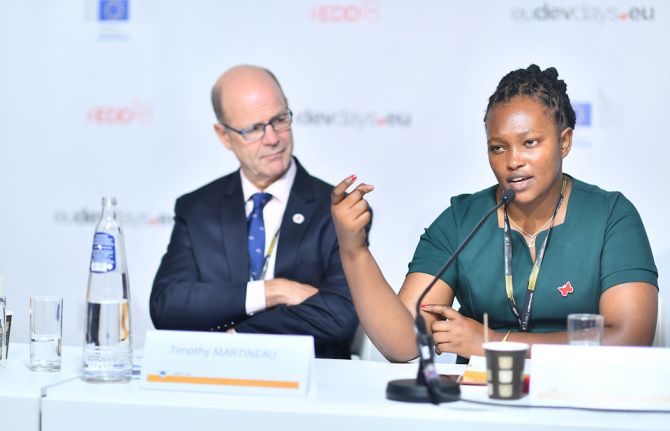
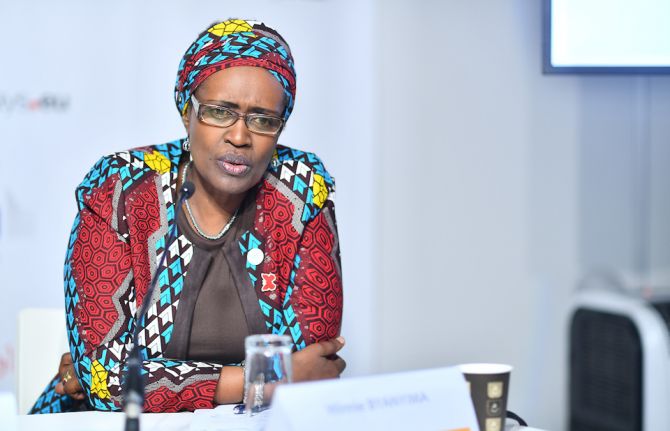
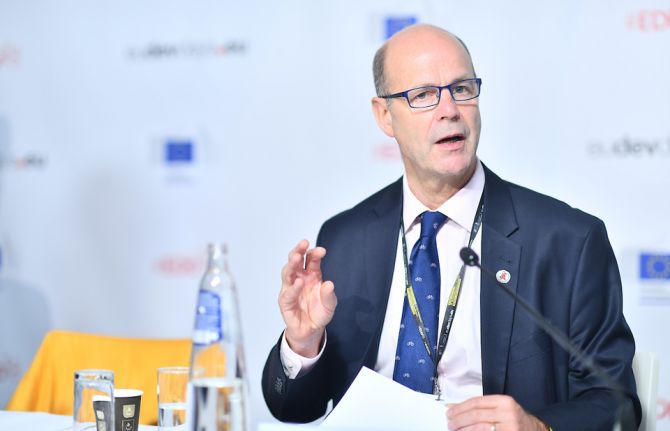
Feature Story
Young women and girls need a seat at the table to stop new HIV infections
07 June 2018
07 June 2018 07 June 2018Lucy Wanjiku is a young mother living with HIV and team leader of Positive Young Women Voices from Kenya. She was just 19 years old when she found out that she was living with HIV, a devastating shock for her. “It was one thing to become an adolescent mother and another to be HIV-positive,” said Lucy. “I was discriminated against by the community, my family and even at the health facility. There is no real support structure available.”
Ms Wanjiku’s story is a familiar one in sub-Saharan Africa. Around 6900 adolescent girls and young women between the ages of 15 and 24 years become newly infected with HIV every week—5500 of whom live in sub-Saharan Africa.
Ms Wanjiku is now using her voice to help others and raise awareness around the challenges that young women face in Kenya on a daily basis. At an event organized by UNAIDS at the European Union Development Days (EDD) forum in Brussels, Belgium, Ms Wanjiku gave the audience an alarming insight into issues around gender-based violence, early marriage, intimate partner violence, transactional sex, low school attendance rates and lack of economic empowerment, which are all key risk factors for HIV that young women and girls face every day.
“Support groups work,” said Ms Wanjiku. “Community-based organizations can facilitate this smoothly when supported. We need to engage more adolescent girls and young women leaders at the decision-making tables to tailor what works for us so that it’s sustainable.”
The event, entitled Empowering Women and Girls—Reducing New HIV Infections, highlighted the importance of empowering young women and girls to stop new HIV infections. Held on 5 and 6 June, the EDD forum was attended by more than 6000 people from 140 countries, representing 1200 organizations from the development community.
“Considerable efforts need to be taken to reach the Fast-Track Target of reducing the number of new HIV infections among adolescent girls and young women to below 100 000 per year by 2020,” said Tim Martineau, UNAIDS Deputy Executive Director, Programme, a.i. “The HIV Prevention 2020 Road Map, launched by UNAIDS, the United Nations Population Fund and partners in 2017, will be critical to guiding efforts and I cannot stress enough the importance of also engaging men and boys for long-lasting change.”
The event was moderated by Ebony Johnson, a public health and gender strategist, and brought together a wealth of expertise and experience from youth activists, people living with HIV, civil society and international development representatives.
Highlighting the importance of access to information, Melodi Tamarzians, a youth ambassador on sexual and reproductive health and rights from the Netherlands, highlighted that only 34% of young people have accurate knowledge about HIV prevention and transmission. “I believe in the infinite power of young people to make a change for themselves and their communities,” she said. “And they need access to comprehensive sexuality education, which is not only a key for preventing violence but has far-reaching individual and societal benefits.”
Winnie Byanyima, the Executive Director of Oxfam International, addressed policy barriers and reminded the audience that in order to enhance agency among young women and girls, there needs to be space for young people, especially women and girls, to take part in decision-making processes. She added that investment needs to be secure in order to strengthen economic empowerment to enhance women’s health. “Young women affected by HIV can be afraid of accessing health care because of a lack of confidentiality, discrimination and cost. We need to invest in peer education and free access to health care to empower women to protect their health,” she said.
UNAIDS, together with a wide range of partners, including women living with HIV and women’s organizations, works towards meeting the needs of girls and women across all targets in the 2016 United Nations Political Declaration on Ending AIDS. UNAIDS works towards ensuring that women and girls everywhere have their rights fulfilled and are empowered to protect themselves against HIV and that all women and girls living with HIV have immediate access to treatment and care.

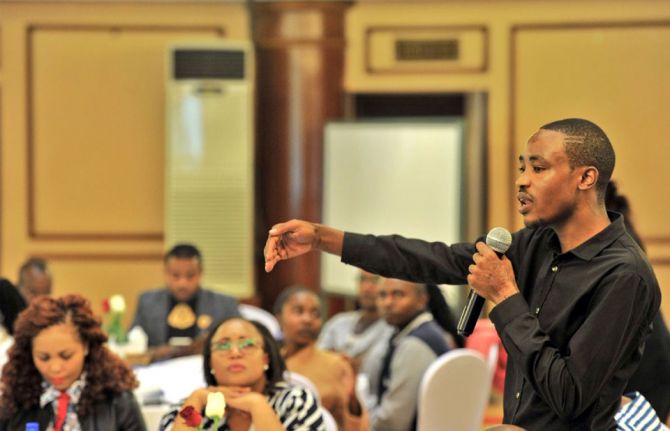
Feature Story
Vibrant civil society remains at heart of the HIV response in Kenya
29 May 2018
29 May 2018 29 May 2018Civil society has played an important role in the response to HIV since the very beginning of the epidemic, calling for access to life-saving medicines, demanding the rights of people living with and affected by HIV and providing critical HIV prevention, care and support. Without civil society, fewer HIV services would be available, particularly to marginalized populations and to people in remote areas.
On a recent visit to Kenya, the Executive Director of UNAIDS, Michel Sidibé, met with members of civil society organizations in Kenya to talk about how to support, reinforce and expand the contribution of civil society towards ending the AIDS epidemic.
“We need a new narrative, not only about HIV treatment but how to restore people’s dignity,” said Mr Sidibé. “We need to demonstrate that no one can better deliver on universal health care than civil society organizations.”
Community responses to HIV result in better health, foster community resilience and are cost-effective. Civil society also needs to be fully involved in decision-making processes to help its work in ensuring respect for human rights, achieving gender equality and diversity and ensuring that no one is left behind.
Wanjiru Mukoma, the Executive Director of Liverpool VCT Health, a Kenyan civil society organization that provides HIV prevention, testing, care and treatment services, facilitated the meeting. She said, “We are at the point where we must frame the HIV agenda. The HIV response cannot be effective without a vibrant civil society.”
The participants asserted that the focus must shift from building the capacity of civil society to meaningful investment in existing capacity in order to increase the impact of its work in the AIDS response.
“Civil society organizations have done a lot of work, but credit does not go to us. We need support to document our work and build our capacity to establish robust monitoring systems of our contribution to Fast-Track,” said Dorothy Onyango, the Executive Director of Women Fighting AIDS in Kenya.
Ensuring the meaningful participation of young people in civil society spaces was also stressed. “We do not want the young at heart to represent us; we are asking for spaces to represent ourselves. We have capacity,” said Joyce Amondi, a young person at the meeting.
During the day, Mr Sidibé also met with Sahle-Work Zewde, the Director-General of the United Nations Office at Nairobi, to discuss sustainability planning to maintain and accelerate the remarkable results that Kenya has achieved towards achieving the 90–90–90 targets, whereby, by 2020, 90% of people living with HIV know their HIV status, 90% of people who know their HIV-positive status are accessing treatment and 90% of people on treatment have suppressed viral loads. They agreed that decentralizing service delivery systems, cutting user fees and stopping the use of falsified medicines would be transformative for the AIDS response in Kenya.
UNAIDS is committed to the meaningful and inclusive participation of civil society at all levels of the AIDS response. By integrating community responses into national AIDS plans and Global Fund to Fight AIDS, Tuberculosis and Malaria concept notes, including budget allocations, UNAIDS supports the funding, development, implementation and monitoring of community service delivery programmes, civil society organizations, advocacy organizations and community networks.
UNAIDS brings civil society organizations together with governments and donors to develop plans, strategies and programmes, review legal and policy environments and respond to emergency and human rights issues. UNAIDS supports civil society organizations to engage in the AIDS response in a coordinated way that respects diverse voices and actions, facilitating civil society advocacy and community-based service delivery.
Region/country
Related

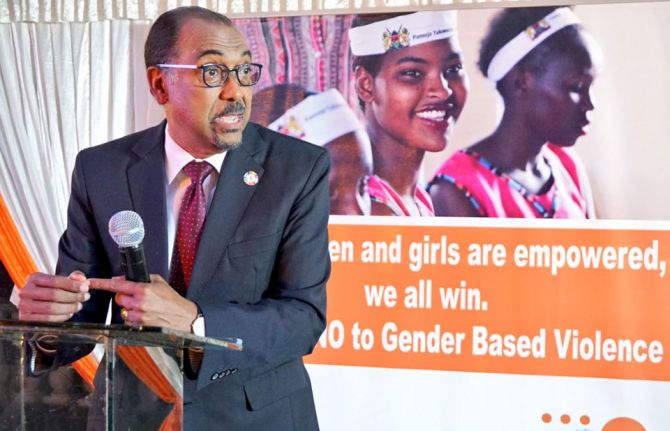
Feature Story
Shining a light on gender-based violence in Kenya: why we must do more
29 May 2018
29 May 2018 29 May 2018Gender-based violence is one of the most persistent violations of human rights across the globe. According to the World Health Organization, about one third of women worldwide have experienced violence. Intimate partner violence increases the risk of HIV, in some regions by up to 1.5 times. Among marginalized populations, a high prevalence of violence is linked with higher rates of HIV infection, in particular among transgender women.
In Kenya, a recent study found that 32% of young women aged 18–24 years and 18% of their male counterparts reported experiencing sexual violence before the age of 18. Gender-based violence reduces the bargaining power to negotiate safer sex, stay on treatment or remain in school.
To shine a light and galvanize action to end gender-based violence in Kenya, the United Nations Population Fund (UNFPA), together with the Kenya Medical Women’s Association and the Kenya Women Judges Association, and partners, launched the Tuongee (Let’s Talk) Campaign on 25 May at an event hosted by Nicolas Nihon, the Ambassador of Belgium to Kenya and UNFPA.
Speaking at the launch, Michel Sidibé, the Executive Director of UNAIDS, said, “Gender-based violence and HIV are intertwined epidemics. If we are to transform either, we must address the structural barriers that drive both.” He spoke about the need to equip young women with the skills and capacities to make informed decisions about their health and underscored the critical importance of engaging boys and men early to change behaviours and challenge norms that allow gender-based violence to persist.
A young survivor of gender-based violence from Kisumu, a port city on Lake Victoria, made a moving and powerful testimony, reminding participants of the critical importance of the campaign and the need to speak up to help survivors to accept and heal. She also urged parents to talk to their children about violence and to support them in speaking out.
Mr Nihon underlined the commitment of the Government of Belgium to combat all forms of gender-based violence and commended the work of the Kenya partners in supporting the survivors.
“Gender-based violence is, unfortunately, not an uncommon phenomenon against women and girls,” said Ademola Olajide, UNFPA Representative to Kenya. “Care and support for the survivors is critical to eliminate gender-based violence and requires a multisectorial approach.”
The participants affirmed that community-level action combined with global advocacy and structural change can lead to change and that there is much potential to build on the good work already done to accelerate results.
Achieving gender equality, advancing women’s empowerment and fulfilling the sexual and reproductive health and rights of women and girls are central to UNAIDS’ work and crucial to reaching the Sustainable Development Goals and achieving the targets set in the 2016 United Nations Political Declaration on Ending AIDS.
UNAIDS, together with a wide range of partners, including women living with HIV and women’s organizations, are working to ensure that women and girls everywhere have their rights fulfilled and are empowered to protect themselves against HIV and that all women and girls living with HIV have immediate access to HIV treatment and care.
Related

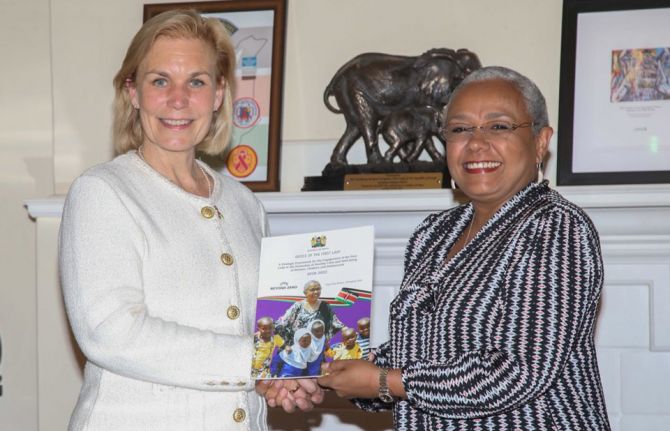
Feature Story
First Lady of Kenya champions a generation born free from HIV
06 June 2018
06 June 2018 06 June 2018Margaret Kenyatta, the First Lady of Kenya, reinforced her commitment to champion the elimination of mother-to-child transmission of HIV in a meeting with UNAIDS Deputy Executive Director Gunilla Carlsson in Nairobi, Kenya, on 29 May.
The First Lady and Ms Carlsson discussed the Beyond Zero platform, a groundbreaking initiative spearheaded by the First Lady. Through Beyond Zero, the First Lady has mobilized resources from the private sector to respond to the health and well-being of women and children, with a focus on HIV and sexual and reproductive health.
“There is so much momentum and support from Kenyans themselves for the Beyond Zero initiative. They feel that it is theirs and that they own it,” said Ms Kenyatta.
Beyond Zero has delivered 52 mobile clinics to every county in Kenya. The operationalization of the clinics has resulted in substantial community mobilization and demand creation for HIV services. Initiatives such as Beyond Zero have contributed to significant progress in the AIDS response in Kenya, with new HIV infections among children aged 0 to 14 years reducing from about 14 000 in 2013 to 6100 in 2016, while in the same period the percentage of mothers delivering without a skilled health provider decreased from 56% to 34%.
Building on those gains, the First Lady launched a new framework earlier this year to advance the Beyond Zero initiative. The framework adopts a life-cycle approach, addressing challenges, including HIV, at different stages of life. Ms Kenyatta’s championship for Kenya to reach validation by the World Health Organization for the pre-elimination of mother-to-child transmission of HIV is a core commitment of the framework.
“Beyond Zero is a powerful initiative. An advocacy platform that has fostered public–private partnership for the health agenda and the elimination of mother-to-child transmission of HIV in particular,” said Ms Carlsson.
Related resources
Region/country
Related

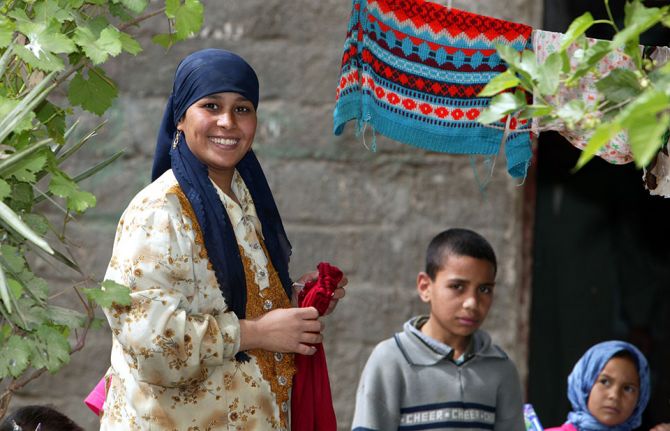
Feature Story
Stepping up sexual and reproductive health services in Egypt
04 June 2018
04 June 2018 04 June 2018In response to a call by women living with HIV in Egypt for an increase in the availability of quality sexual and reproductive health services delivered free from stigma and discrimination, UNAIDS mobilized partners and engaged with Egypt’s national AIDS programme.
The result was a pilot project that ran from 2016 to 2018 in which almost 300 women across the country were provided with family planning, antenatal care, support during delivery, postpartum care and guidance on the prevention of mother-to-child transmission of HIV.
On 30 May, national stakeholders, including representatives of the Ministries of Foreign Affairs and Health and Population, civil society, academia and people living with and affected by HIV, gathered to highlight the key achievements, experiences and lessons learned from the pilot.
“I benefited from the project counselling service throughout my pregnancy. I started taking medicine, and, with follow-up, I had a child free from HIV, which I never thought was possible or an option,” said an Egyptian woman living with HIV.
The pilot project achieved outstanding results, reaching nearly double the number of people originally planned to be reached and building institutional expertise in sexual and reproductive health. Counselling and psychosocial support was provided by health professionals and supported by women living with HIV.
“This project is a continuation of the collaboration and fruitful partnership between UNAIDS and the Egyptian Government. We congratulate the Government of Egypt for addressing the needs of a highly marginalized population,” said Ahmed Khamis, the UNAIDS Country Manager for Egypt.
Dr Ahmed Khamis, UNAIDS Country Manager, gives the opening speech on the closing and final dissemination of key results of the “Enhancing Sexual and Reproductive Health of Women Living with HIV” pilot project; with Dr Alaa Eid, Under Secretary for Preventive Medicine, Ministry of Health and Population, H.E. Laurens Westhoff, Ambassador of the Netherlands in Cairo and Ambassador Seif-alla Kandeel, Director of UN Specialized Agencies, Ministry of Foreign Affairs (from left to right). Photo taken by Mohamed Ezz
The pilot programme was funded through financial support from the Embassy of the Netherlands in Egypt and covered the Giza and Gharbia Governates of Egypt and was later extended to the Dakahlia Governate.
“The Netherlands is strongly committed to curbing the spread of HIV worldwide as an integral part of our contribution towards the achievement of the Sustainable Development Goals. We are proud of our partnership with UNAIDS and the Egyptian Ministry of Health. The Netherlands Government is committed to participate in the next step,” said Laurens Westhoff, Ambassador of the Netherlands to Egypt.
As the next step, the Netherlands is finalizing an agreement for a scaled-up three-year project, doubling the number of women living with HIV reached.
“There is no silver bullet to combat HIV. It’s only through partnership that the challenges of awareness, attention and access to medicine can be tackled,” said Seif-Allah Kandeel, Director, United Nations Specialized Agencies, Egyptian Ministry of Foreign Affairs.
Region/country

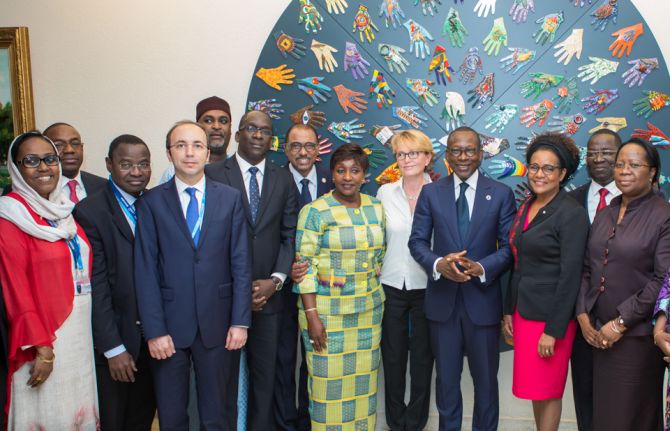
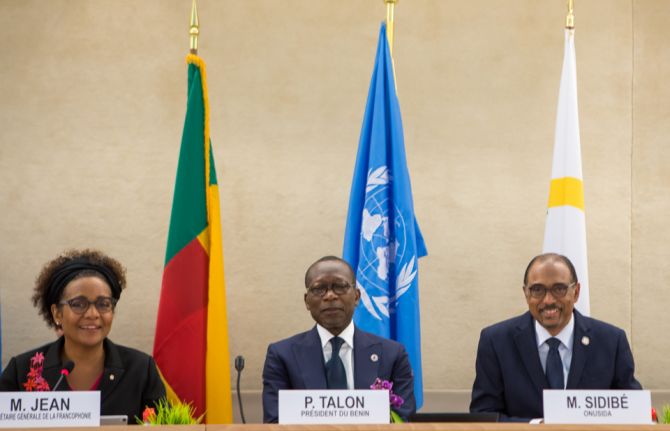
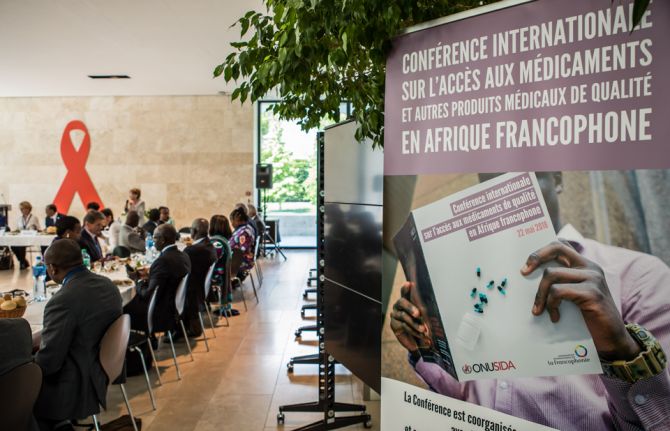
Feature Story
A pledge to respond to falsified and substandard health products in francophone Africa
29 May 2018
29 May 2018 29 May 2018Twenty-five countries and 10 international organizations have pledged to respond to falsified and substandard medicines in French-speaking Africa.
On the sidelines of the 71st session of the World Health Assembly on 22 May, the Organisation internationale de la Francophonie (OIF) and UNAIDS, in collaboration with the World Health Organization and the Fondation Chirac, hosted a conference entitled Access to Quality Medicines and Other Medical Products in Francophone Africa, which brought together nearly 400 participants, including a number of health ministers. They adopted a declaration with commitments to advance access for all, especially the poorest, to assured-quality health products.
Thousands of people die each year because of falsified or substandard medicines, especially in many African countries, where up to seven out of 10 medicines don’t meet the quality standards required by international health regulatory agencies.
“Finding ways and means for better access to quality medicines and medical products in developing countries, especially in Africa, at all costs is now an emergency because, despite conventional international measures, the intensifying scourge of falsified medicines continues to wreak havoc among the poor,” said Patrice Talon, the President of Benin.
Michel Sidibé, the Executive Director of UNAIDS, agreed. He said, “There is an urgent need to support efforts to stop the entry into the market of falsified and substandard medicines everywhere, including African countries. Access to quality medicines is at the heart of the right to health for all and it is also a prerequisite for universal health coverage.”
The signed declaration aims to foster mechanisms to assure the quality of all health products that reach the African market. Therefore, it calls for the strengthening of health regulatory capacities in the continent, paving the road for the local production of medicines.
OIF’s Secretary-General, Michaëlle Jean, would like the document to be the basis of an action plan. “We intend to raise this with all heads of state and government of the francophone area at the 17th Francophonie Summit in October, mobilizing them around concrete solutions and sustainable financing at the national, regional and international levels,” she said.
Related links

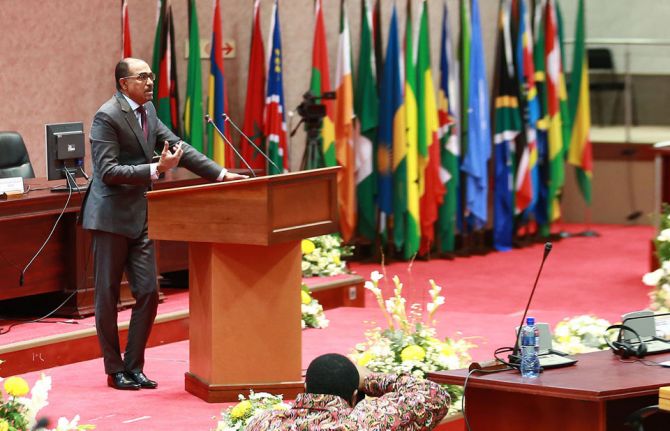
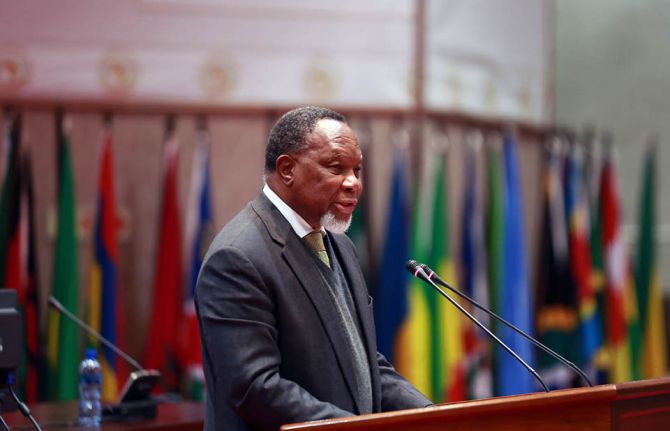
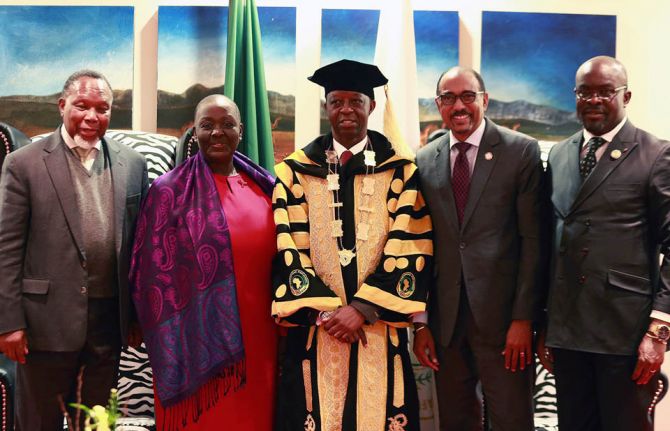
Feature Story
African parliamentarians consider historic resolution on advancing the right to health
14 May 2018
14 May 2018 14 May 2018Parliamentarians from across Africa are considering a historic resolution to promote the right to health and achieve targets on HIV, tuberculosis, malaria and other health emergencies, such as cervical cancer and hepatitis.
Michel Sidibé, the UNAIDS Executive Director, addressed the Pan African Parliament on 9 May to urge its members to express their firm commitment and determination to end the AIDS epidemic and deliver on the Abuja Declaration and the plan of action on achieving health targets in Africa. The plan of action resulted from a high-level parliamentary meeting convened in October 2017 by UNAIDS in partnership with the Pan African Parliament and the African Union.
“A Pan African Parliament resolution will help to achieve health targets in Africa. Parliamentarians, as champions in their communities, can help achieve these targets,” said Mr Sidibé.
The final decision of the parliament will be confirmed after the sixth ordinary session of the fourth parliament concludes on 18 May. The resolution will be the first of its kind for the Pan African Parliament since it commenced in 2004.
“AIDS is not over. We need to reach everyone who does not yet know that they are HIV-positive,” said Kgalema Motlanthe, former President of South Africa.

